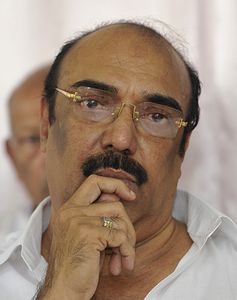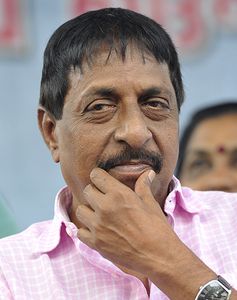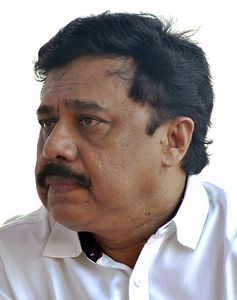In the late 1980s, a new form of standup comedy began to pull in crowds in Kerala. Its performance called for a well-lit stage and half a dozen microphones, either hanging from the roof or fixed to height-adjustable stands. The performers were all men, in dhotis and loose kurtas, their mops fashionably combed and faces luxuriously talcumed.
They opened the show by imitating sounds of wind and percussion instruments, a crude form of beatboxing. They would then perform comedic sketches, laced with innuendos and double entendres. At the end came the pièce de résistance: mimicking the voice and mannerisms of politicians and movie stars.
The success of this ‘mimics parade’ (mimicry was the ‘art form’ and mimics parade, the process) was measured on a harsh scale of 1. It would be either a grand success, with a raucous audience begging for an encore, or a total flop.
By the early 1990s, mimicry became so popular that some of the artistes entered the more respectable world of movies. Siddique, who was part of the first mimicry troupe in Kerala, would later direct Salman Khan in the blockbuster Bodyguard.
Siddique had been part of Kalabhavan, a Kochi-based studio established in the sixties and run by a Catholic priest called Fr Abel. Kalabhavan was primarily into organising concerts, and mimicry artistes were initially employed to provide comic relief between gigs. But, as audiences began to demand longer interludes, the canny priest sensed an opportunity and formed the first professional mimicry troupe.

For aspiring mimics, Kalabhavan was what The Globe had been to thespians in London. By the mid-1990s, those lucky enough to enter Kalabhavan were assured of opportunities in films, as many of its alumni had become big names in the industry. There was actor Jayaram, writer-directors Siddique and Lal; and actor-director Cochin Haneefa, to name a few.
But, among those first-generation mimics, none would become as famous and influential as a lean young man from Kochi. Born Gopalakrishnan Pillai, he got his big break in films in 1994, when he was 27. The name of the lead character he played in that film, Dileep, later became his screen name as well.
Known for his quick wit and oversized shirts, Dileep built a reputation for playing the ‘nice guy next door’, mainly in films that banked on their ensemble cast. By the late nineties, though, a series of hits made him bankable enough to headline big projects. He began churning out films that were often derided by critics, but were hugely profitable (including the original Bodyguard, which was also directed by Siddique). After he turned producer in 2003, Dileep launched talents that are now marquee names in Malayalam cinema, sidelined those with whom he had differences, produced a one-of-a-kind blockbuster that featured nearly all Malayali actors, broke apart two prominent industry unions, and replaced them with organisations that he himself came to control.
“He may not be a great actor, but he is a brilliant businessman who understands the pulse of cinema,” said actor-director Sreenivasan. “He excelled because he managed to turn his passion for all aspects of cinema into successful business ventures.” Sreenivasan’s elder son, Vineeth Sreenivasan, debuted as director in a movie produced by Dileep.
In January this year, Dileep broke the deadlock over sharing theatre revenues between Kerala Film Exhibitors Federation (KFEF) and the Kerala Film Producers Association (KFPA). Theatres in the state had remained closed for nearly two months, as KFEF refused to budge on its demand that exhibitors be given a larger share of theatre revenues. Dileep then engineered a split in KFEF that resulted in 64 theatre owners forming the Film Exhibitors United Organisation of Kerala (FEUOK). “Hereafter, theatres will never be shut down for any reason,” he declared, after being elected president of FEUOK on January 24.
It was Dileep’s crowning achievement in terms of expanding his influence. In the preceding years, he had increased his hold on the three primary stakeholder groups in Malayalam cinema: he was a prominent member of the producers’ association, owner of a theatre chain, and treasurer of AMMA, the Association of Malayalam Movie Artistes. As president of FEUOK, he could now influence the way movies were made, marketed and distributed in Kerala.

The successes were not without its share of brickbats. Dileep has, at various points in his career, been accused of failing to honour contractual commitments, scheming to sabotage projects led by other stars, and exerting pressure on directors and producers to deny roles to adversaries.
None of the critics, however, could have predicted the speed at which his fall would come.
ALSO READ: Dileep is eighth accused. Earlier reports suggested that he would be first accused
On the night of February 17, 2017 goons waylaid a well-known actor while she was on her way to Kochi from Thrissur. One of them raped her and took obscene pictures as they drove around Kochi for two hours. She was dropped off in the suburbs with her driver, who allegedly was part of a conspiracy to blackmail her.
Contrary to what the abductors had expected her to do, the actor lodged a complaint with the police. As news of the incident broke, sparking widespread public outrage, the police arrested two suspects the following day. The prime accused, Sunil Kumar and Vijish, were arrested four days later in dramatic fashion. In an effort to surrender and get bail, they had tried to enter a courtroom in Kochi dressed as lawyers.
Even as support for the actor poured in, rumour mills went into overdrive, hinting at Sunil Kumar’s perceived proximity to celebrities, for whom he used to work as driver on call. Several celebrities, including the victim herself, had known him by his nickname ‘Pulsar Suni’.

A history-sheeter, Sunil confessed to the police that he had told the victim that he was raping her on a “quotation”, or contract. Conspiracy theorists began weaving stories based on Dileep’s alleged animosity towards the victim, who had stood by his estranged wife, actor Manju Warrier, during their messy divorce in 2015. Months before the assault, the victim had written to AMMA, accusing Dileep of “trying to banish her” from the industry.
As the canards gained traction, Dileep said he had no connection with any of the accused. It later turned out that Sunil had been on location with him in Thrissur, where his new movie was being shot, months before the assault. At the music launch of that film, nearly two months after the assault, Dileep painted himself as a victim of character assassination, and said his family was under duress. On another occasion, he insinuated that the victim and Sunil were “close friends who had spent time together in Goa”.
Dileep’s attempts at distancing himself from the case appeared rather frantic. At one point, the police revealed that Dileep and director Nadirsha, his friend from the mimics parade years, had submitted a forged recorded telephone call to prove that Sunil was blackmailing the duo. This was in May, after it was revealed that Sunil had written to Dileep in April demanding Rs 2 crore to keep his name out of the case. It was also reported that Sunil had called Nadirsha, saying he wanted the money within five months and that he did not want to jeopardise Dileep by calling him directly.
Dileep was arrested on July 10, 2017. The police said he had paid Rs 10,000 in advance and promised Rs 1.5 crore to Sunil to assault the victim and record videos of it. Rejecting Dileep’s bail plea on July 24, the High Court said there was prima facie case against him. While Dileep spent 85 days in judicial custody, the police reportedly collected 19 crucial pieces of evidence against him.
During the course of the investigation, Dileep’s four bail pleas were rejected. Each time, the court agreed with the prosecution’s view that he was a powerful figure who could influence witnesses if granted bail. On October 3, the High Court ruled favourably on the fifth plea, saying “the circumstances in the case” had changed.
On November 21, Dileep got another breather, as the court granted him permission to visit Dubai for four days for the opening of a branch of his restaurant chain. The following day, however, the police filed a charge-sheet against Dileep, making him the eighth accused.
The police had widened the scope of its investigation to include allegations of shady real estate and financial deals involving Dileep. “Let the court decide if Dileep is guilty,” said Vinayan, a prominent director. “But I want to point out how a larger revenge culture has grown in the industry and how criminal elements are fed by it.”
Vinayan had been general secretary of the Malayalam Cine Technicians Association (MACTA), when Dileep allegedly split the organisation to help form the rival Film Employers’ Federation of Kerala (FEFKA) in November 2008. “The split was a result of manipulation and planning,” said Vinayan.
According to him, Dileep had accepted Rs 40 lakh in advance to act in a film directed by Thulasidas. Later, the actor reportedly threatened the film’s producers that he would withdraw from the project if they did not drop Thulasidas, whose previous movie had been a flop.
MACTA, which took up the issue, asked Dileep to resolve the matter within three months, failing which he would be boycotted by its members. Within three days of that warning, said Vinayan, MACTA was split, with several top directors and screenwriters who supported Dileep openly accusing Vinayan of being autocratic. “Interestingly, many of the directors came to know that they had quit MACTA only when Dileep called them up and informed them that they had become part of FEFKA. Nobody wanted to get on the wrong side of him, so they went with his plan,” said Vinayan.
Other than the fact that he is a superstar, Dileep owes his clout to his keen understanding of how the Malayalam film industry operates. Unlike other film scenes in India, Malayalam cinema is heavily unionised. There are guilds representing every cog in the film machine—from key grips and crane crew to screenwriters and stars.
Until recently, it was impossible to make and market films in Kerala without the blessings of prominent unions. Take, for instance, the Kerala Film Chamber of Commerce, an association of producers, distributors and exhibitors formed in the 1970s. KFCC’s governing council issued three certificates—one each for membership, movie title registration and publicity clearance—without which a producer could not approach the censor board for screening. It lost its monopoly on green-lighting projects a few years ago, when the High Court ruled that producers could approach the censor board directly.
But KFCC has hardly been the most powerful lobby in Malayalam cinema. That tag arguably belongs to AMMA. Founded in 1995, a year after Dileep’s breakthrough in films, AMMA styles itself as a welfare organisation for actors, the first of its kind in India. Its revenues come mainly from the stage and television shows it organises.
In early 2008, though, AMMA faced a crisis. Its plans to produce a film with an all-star cast, the revenues from which would go to a provident fund for retired and struggling actors, were running aground. Though it was decided that the entire cast would work without remuneration, no producer was willing to shoulder the film’s huge production cost.
Dileep turned out to be the saviour. Supporters say he took a gamble by deciding to bankroll the film, titled Twenty:20, while others say he was shrewd enough to grab a golden opportunity—he would get actors and their dates for free. “I have not seen anyone as clever as Dileep. He is brilliant at planning and execution, and we all witnessed it during the production of Twenty:20,” said Salim Kumar, a National Award-winning actor.
Twenty:20’s huge success won Dileep much goodwill among actors, as a lion’s share of the profits went to AMMA. Interestingly, the film was released in November 2008, the same month when Dileep was alleged to have been instrumental in breaking up MACTA.
Dileep is said to have leveraged his influence in AMMA to increase his hold in other areas of filmmaking. According to Jayaraj, an award-winning director, Dileep has played a crucial role in maintaining the status quo in the industry. Mammootty and Mohanlal have long been considered Kerala’s top stars, with Dileep as a close third. “Everyone who wants the monopoly to continue will support Dileep,” said Jayaraj.
FEFKA, which Dileep helped form in 2008, has been accused of blackballing actors and technicians. In March this year, the Competition Commission of India directed FEFKA and AMMA to pay Rs 11.25 lakh as compensation to Vinayan, who had accused both the organisations of pressuring artistes to withdraw from his projects.
Idavela Babu, AMMA’s joint secretary, maintains that there was no ban on Vinayan. “It was a story cooked up by him,” said Babu. “Also the verdict held AMMA responsible for things the commission found FEFKA had done.”
Director B. Unnikrishnan, who has been heading FEFKA since its formation, said: “We have appealed against the commission’s verdict. Our argument is that FEFKA is a trade union. Trade unions always bargain collectively.”
But the unions have not been supportive of actors who do not belong to any prominent camp. “In the Malayalam film industry, no one is anyone’s friend,” said a young actor. According to him, there are cliques in the industry that decide who gets to act or direct films.
“People know who are the big-shots to be pleased,” he said. “Among the young actors, it is only Prithviraj who calls a spade a spade.” Interestingly, it was Prithviraj who was one of the first to demand action against those involved in the conspiracy to assault the female actor.
Perhaps, a measure of Dileep’s influence is that most unions have been rooting for him ever since he became a suspect in the case. Said Liberty Basheer, who was the head of the exhibitors’ federation that Dileep broke up early this year: “Nobody will speak out against Dileep as everyone, including our superstars, has deals with him. He has got all of them involved in one business or the other. Now it has become their responsibility to protect him.”
The day Dileep got bail, FEUOK reelected him president. But he declined the post. A section of actors in AMMA, which had expelled Dileep after he was arrested, has openly come out in his support. “I don’t think Dileep has committed any crime,” said KPAC Lalitha, actor and chairperson of the Kerala Sangeetha Nataka Akademi. “He is somebody who has the ability to understand others’ pain. So how can he commit such a crime?”
What is deplorable, as many people have pointed out, is that the victim herself has not received the kind of consideration that Dileep has been getting. Days after the assault came to light, AMMA passed a resolution forbidding woman members from travelling alone, thereby implicitly putting the blame for the assault squarely on the shoulders of the victim. “AMMA [which means mom in Malayalam] is like a mother for Dileep and a stepmother for others,” said director Rajasenan.
According to Basheer, the case is unlikely to make any dent in Dileep’s career. “He will continue to act,” he said after Dileep was arrested. “Actors like Sanjay Dutt have come back from jail and delivered hits.”
And deliver a hit, Dileep did. On September 28, barely a week before he was granted bail, his film Rama Leela opened to tremendous response. Many drew a parallel between the film’s plot and the star’s real-life predicament. In the film, Dileep plays a politician who is accused of murder and is on the run to prove his innocence.
Rama Leela’s success has unnerved many, especially those who have been demanding reforms in the industry. “Dileep has his hands on every aspect of filmmaking. He can create problems for many,” said a young filmmaker, who feels that Rama Leela’s success was a turning point.
As regards the case, a lot has changed since Dileep was granted bail. Weeks before the charge-sheet against him was filed, he wrote to the chief minister alleging that Loknath Behera, the director-general of police, had “a vested interest” in framing him. Dileep also alleged that Behera had personally tried to influence witnesses.
What is worrying the police is that two of the witnesses in the case have turned hostile. “We are convinced of Dileep’s involvement in the case. But, if you ask me whether we have enough evidence to ensure that he will be put behind bars, then I would not have the same conviction,” said a senior officer who played a crucial role in the investigation.
For his part, Dileep has kept a rather low profile since he was granted bail. “Dileep is hopeful that there would be a favourable verdict soon and is refusing to speak to the media at this juncture,” a source close to the actor told THE WEEK.
On October 27, Dileep turned 50. Unlike previous years, there were no celebrations this time. The stubble covering his face when he was arrested had grown into a full beard by the time he was released, a sign his fans took for the hardships he had endured in the past several months. “Dileep will continue to grow his beard, though he has slightly trimmed it. Also, he needs the same look for his new film, Kammara Sambhavam,” the source told THE WEEK. Rama Leela’s success has been a shot in the arm for Dileep. “This shows that people have faith in me,” he told people close to him, according to the source. “They know that I have not done anything wrong.”
On November 28, Dileep flew to Dubai to resume business as usual. But his trials are far from being over. As the prosecution meticulously prepares for trial in the assault case, his homecoming, most certainly, will not be sweet.
WITH KARTHIK RAVINDRANATH AND JEEJO JOHN PUTHEZHATH




